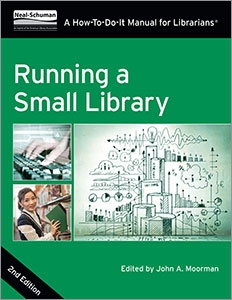Primary tabs
You don't need to be an ALA Member to purchase from the ALA Store, but you'll be asked to create an online account/profile during checkout to proceed. This Web Account is for both Members and non-Members. Note that your ALA Member discount will be applied at the final step of the checkout process.
If you are Tax-Exempt, please verify that your account is currently set up as exempt before placing your order, as our new fulfillment center will need current documentation. Learn how to verify here.
- Description
- Table of Contents
- About the author
- Reviews
Since running a small library—public, academic, school, or special—often means making do with little or no staff, this challenging task calls for its own set of skills and expertise. That's where Moorman's how-to manual comes in, offering guidance on every essential aspect of what it takes to run a small library. Fully revised and updated, including a new chapter on digital library services, the second edition covers such day-to-day issues as
- budgeting, from planning to advocacy;
- developing and implementing policies and procedures;
- maintaining facilities;
- acquisition, cataloging, and collection development and management on a shoestring;
- circulation;
- programming, outreach, and community partnerships; and
- library technology, from computers and networks to automation systems and beyond.
Also featured is an updated resource section listing furniture, automation, book, and periodical vendors; electronic discussion and support groups; professional organizations; and resources for more information. This book is a must-have for any solo librarian or library manager with a small staff.
Preface
Part I: Introducing the Small Library
1 College Libraries, by Cy Dillon
2 Community College Libraries, by Rodney Lippard
3 Special Libraries, by Richard E. Wallace, revised by Elizabeth Terry Long
4 Public Libraries, by John A. Moorman
5 School Libraries, by Linda Williams
Part II: Administration in the Small Library
6 Budgeting, by John A. Moorman
7 Policies and Procedures, by John A. Moorman
8 Staffing, by John A. Moorman
9 Planning, by Nelson Worley, revised by John A. Moorman
10 Buildings, by Frederick A. Schlipf
11 Governing Boards and Governmental Relations, by John A. Moorman
12 Friends Groups and Foundations, by John A. Moorman
13 Community Partnership Development, by Janet L. Crowther and Barry Trott
14 Development, by Patty Purish O'Neill
Part III: Public Services in the Small Library
15 Adult Services, by Alicia Willson-Metzger
16 Youth and Young Adult Services, by Noreen Bernstein and Jessica McMurray
17 Digital Services, by Barry Trott
Part IV: Collection Development in the Small Library
18 Selection, by Barbara Riebe
19 Ordering, by Laura Morales
20 Cataloging, by Laura Morales
21 Circulation, by John A. Moorman
22 Weeding, by Barbara Riebe
Part V: Computers and Automation
23 Personal Computers and In-House Networks, by Karen C. Knox
24 Integrated Library Systems, by Karen C. Knox
Running a Small Library Sourcebook
Source A: List of State Library Agencies
Source B: List of Book and Periodical Vendors
Source C: List of Library Furniture and Supply Vendors
Source D: List of Automation Vendors
Source E: Professional Organizations
Source F: Professional Statements
About the Editor and Contributors
Index
John A. Moorman
John A. Moorman has worked as director of five public libraries and a multi-type library system, most recently the Decatur (Illinois) Public Library and the Williamsburg (Virginia) Regional Library. He has a PhD from the University of Illinois library school. He has been active in state and national library associations. When not working with buildings, he developed a specialty in legislative matters, served as a registered lobbyist, and chaired legislative-related committees for the Illinois and Virginia Library Associations. He is a past president of the Virginia Library Association and a lifelong elected honorary member of that association. Within the American Library Association (ALA) he served on the Public Library Association’s Board of Directors, the ALA Council, and the ALA Executive Board, as well as serving on, and chairing, many committees and task forces.
"While intended for libraries with small staffs, it encourages all to think big."
— Leadership & Management Division (LMD) blog
"It would be most helpful to new administrators who come to the job with very little training or experience. It will also be useful to librarians taking on new duties in unfamiliar segments of library work. Recommended."
— ARBA
"If you liked the first edition, you will like the second … A helpful book for libraries that do not have professional staff."
— Technicalities



